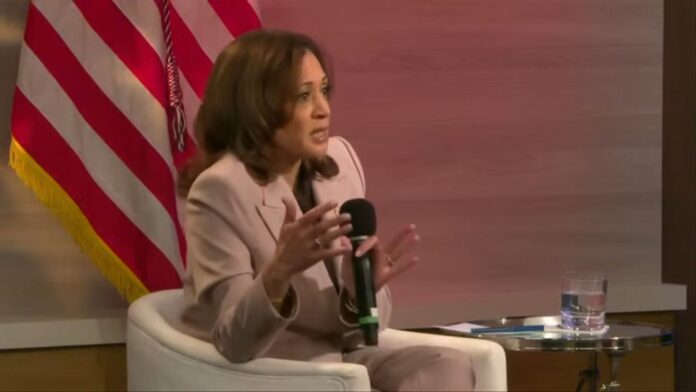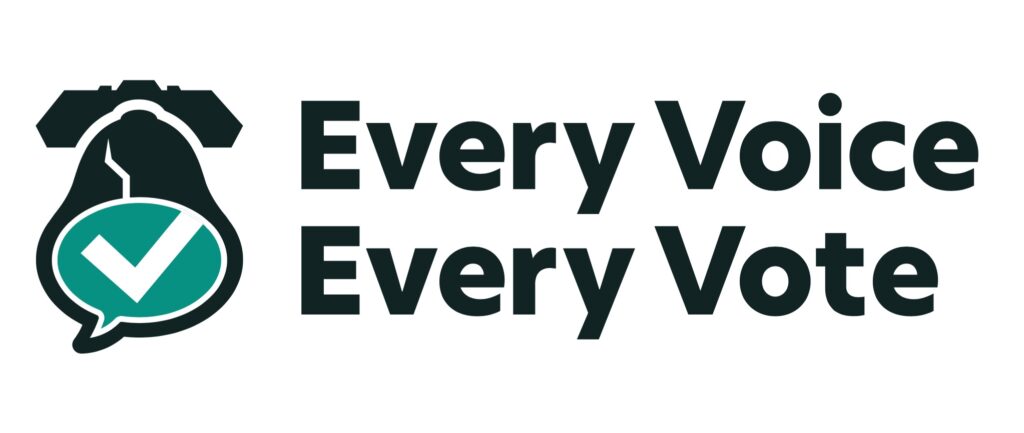
Vice President Kamala Harris was in Philadelphia on Tuesday, Sept. 17. Harris attended a voter-registration drive at Community College of Philadelphia with Mayor Cherelle Parker. She was also the guest of the National Association of Black Journalists (NABJ) in an event sponsored by WHYY and hosted by NABJ.
Gerren Gaynor, White House correspondent and managing editor for politics for theGrio, Eugene Daniels, White House correspondent and co-author of Politico Playbook, and Tonya Mosley, a co-host of NPR’s Fresh Air, were the moderators for NABJ’s conversation with Harris at WHYY. Daniels is also the first Black and first gay president of the White House Correspondents’ Association.
The hour-long grilling of Harris resulted in some contentious moments as the Democratic nominee was pressed on key issues for the campaign and particularly for Democratic and youth voters, like her stance on the Israel-Gaza war and how it might differ from President Joe Biden. Mosley, Gaynor and Daniels often interrupted Harris and pressed her to give more expansive responses to their questions.
Also at the invitation-only event were about 100 college students.
Harris spoke about earning the Black male vote in particular, as polls have shown some Black male voters leaning toward former President Donald Trump based on his contention that the economy during his presidency was better for Black men and Black jobs. Black gay and bisexual men have been especially hard hit by the economy both during and since the pandemic.
Harris discussed the importance of entrepreneurship and establishing and supporting small businesses for Black men, a topic she has focused on while campaigning. She said, “Our young Black men, just like any group of people, our small businesses are really the backbone of the economy overall, and when they do better, we all do better.”
Another issue of key importance to Black LGBTQ+ people and the community overall is medical debt, which impacts Black Americans even more heavily than others. Harris said her administration would work to address this complex problem.
Harris also said, “Part of my approach is understanding the obstacles that traditionally and currently exist to allow any, including Black men, be able to achieve economic wealth.”
Harris said, “I think it’s very important to not operate from the assumption that Black men are in anybody’s pocket. Black men are like any other group, you’ve gotta earn their vote.”
In addition to her own policy points on housing, child tax credits and lowering prices for consumers, Harris was strongest on reproductive rights, an issue on which she has been a leader since Roe v. Wade was overturned in 2022. As a senator, Harris had also co-sponsored legislation banning states from restricting abortion rights. She had voted against a bill that would ban abortions after 20 weeks of pregnancy as well. As vice president, Harris was the first to visit an abortion provider when she visited a Planned Parenthood clinic in the spring.
Asked if she supports codifying the restrictions of Roe v. Wade, which allowed states to ban abortion in the third trimester of pregnancy, Harris was succinct, saying, “we need to put the protections of Roe v. Wade back into law. And when that bill gets passed by Congress, I will proudly sign it into law.”
Harris said, “[A woman is] smart enough to know what’s in her best interest instead of having her government tell her what to do. Especially a bunch of people in these state capitals who think they’re in a better position to tell her what to do.”
In a conversation about gun violence, Harris was asked if there was another option beyond an assault weapon ban to deal with the other problem—handguns, which are responsible for more than half of gun homicides. Harris said there are “very few solutions we haven’t thought of,” but also admitted there are many problems with the sheer volume of guns and of how many are simply illegally procured. Ryan Routh, who is alleged to have attempted to assassinate former president Trump Sunday, had an assault weapon with a missing serial number. As a convicted felon, he was not legally entitled to purchase or own a gun.
Harris also said it’s essential to end gun-show loopholes where gun dealers are not required to register their sales.
“I myself protested at a gun show 10-15 years ago about the gun-show loophole and why we need to close that,” she said.
Harris also reiterated that she and running mate, Gov. Tim Walz, are both gun owners and that, “We’re not trying to take any guns away from anyone but we do need an assault weapons ban.”
Mosley, Daniels and Gaynor pushed Harris to address reparations, a subject the Biden administration has side-stepped. Harris did not answer whether she would issue an executive order to create a commission to study reparations, saying it would be an issue for Congress.
On Israel-Gaza, Harris reiterated her previous stance which she stated at the debate Sept. 10 and more fully at the Democratic National Convention last month. Harris said, “I absolutely believe that this war has to end, and it has to end as soon as possible, and the way that will be achieved is by getting a hostage deal and the cease-fire deal done, and we are working around the clock to achieve that end.”
When asked if Americans are better off than four years ago, Harris acknowledged there is still work to be done but expressed optimism about the future.
“I do believe that I offer a new generation of leadership for our country,” Harris said.
Without mentioning Trump by name, Harris said, “Let’s turn the page and chart a new way forward and say you can’t have that microphone again.”
At the end of the hour, discussion turned toward recent antagonistic rhetoric by Trump and his running mate JD Vance. Harris said the politically charged rhetoric that has demonized vulnerable groups like Haitian immigrants and LGBTQ+ people has resulted in a lot of people feeling unsafe.
Harris said that “there are far too many people in our country right now who are not feeling safe. Not everybody has Secret Service. The ‘don’t say gay’ laws coming out of Florida — Members of the LGBTQ+ community don’t feel safe right now. Immigrants or people with an immigrant background don’t feel safe right now. Women don’t feel safe right now. And so, yes, I feel safe. I have Secret Service protection, but that doesn’t change my perspective on the importance of fighting for the safety of everybody in our country and doing everything we can to again lift people up and not beat people down so they feel alone and are made to feel small and made to feel like they’re somehow not a part of it or us.”
Harris appeared six weeks after Trump questioned her ethnicity and clashed with ABC News correspondent Rachel Scott at the organization’s national convention in Chicago, claiming that Harris “became Black” because it was better for her career than identifying as Asian. Harris’s mother was an Indian immigrant and her father a Jamaican immigrant. Harris attended an HBCU and has always identified as a Black woman while also embracing her Indian heritage.
Harris’s attendance at the event was the first time in years both the Democratic and Republican presidential candidates have accepted the NABJ’s invitation for an interview.

